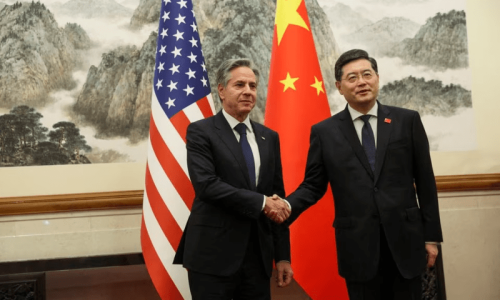China and the United States agreed on Monday to stabilise their intense rivalry so it doesn’t veer into conflict but failed to produce any major breakthrough during a rare visit to Beijing by US Secretary of State Antony Blinken.
Chinese President Xi Jinping welcomed “progress” after shaking hands with Blinken at the Great Hall of the People, a grand venue usually reserved for greeting heads of state.
The top US diplomat and Xi both stressed the importance of having a more stable relationship, as any conflict between the world’s two largest economies would create global disruption.
However, China refused to entertain Washington’s bid to resume military-to-military communication channels and cited US sanctions as the obstacle. The two sides appeared entrenched in their positions over everything from Taiwan to trade, including US actions toward China’s chip industry, human rights and Russia’s war against Ukraine.
At one of the most significant US-China exchanges since American President Joe Biden took office, it was not clear how they would overcome their differences, but they agreed to continue their diplomatic engagements with more visits in the coming weeks and months.
At a news conference concluding his two-day trip to Beijing, the first by a US secretary of state since 2018, Blinken said Washington had achieved its objectives for the trip, including raising its concerns directly, trying to set up channels for dialogue and exploring areas of cooperation.
The trip was postponed in February after a suspected Chinese spy balloon flew over US airspace.
But he said progress was not straightforward.
“The relationship was at a point of instability, and both sides recognised the need to work to stabilise it,” Blinken said before leaving the country.
“But progress is hard. It takes time. And it’s not the product of one visit, one trip, one conversation. My hope and expectation is: we will have better communications, better engagement going forward.”
US officials have been playing down the prospect of a major breakthrough in talks, but they hoped Blinken’s visit will pave the way for more bilateral meetings in coming months, including possible trips by Treasury Secretary Janet Yellen and Commerce Secretary Gina Raimondo.
It had been hoped that it would even pave the way for a summit between Xi and Biden later in the year.
Biden and Xi last met on the sidelines of the G20 summit in Bali, Indonesia in November, pledging more frequent communication, although ties since then have deteriorated over Taiwan, espionage accusations and other concerns.
“The two sides have also made progress and reached the agreement on some specific issues. This is very good,” Xi told Blinken across a long table bedecked with pink lotus flowers.
Blinken responded by saying the two countries have a responsibility to manage their relationship and that the United States was “committed to doing that.”
His meetings in Beijing, including talks with China’s top diplomat Wang Yi and foreign minister Qin Gang, had been “candid and constructive,” Blinken added.
It was not clear from Xi’s remarks what progress he was referring to, although he told Blinken that China “hopes to see a sound and steady China-US relationship” and believes that the two countries “can overcome various difficulties”, according to a Chinese readout of the talks.
He also urged the US not to “hurt China’s legitimate rights and interests,” a signal of potential flashpoints such as Taiwan, the democratic island Beijing claims as its own.
Blinken raised contentious issues such as Taiwan, human rights, North Korea’s provocations and US concerns with Beijing’s intelligence activities in Cuba, the State Department said.
Taiwan core issue
The lack of open communication channels between the two countries has sent jitters around the world, and Beijing’s reluctance to engage in regular military-to-military talks with Washington has alarmed China’s neighbours.
Speaking to reporters after the talks, senior foreign ministry official Yang Tao said US sanctions were blocking progress on improving military-to-military communications.
China’s Defence Minister Li Shangfu, who came into post in March, has been sanctioned since 2018 over the purchase of combat aircraft and equipment from Russia’s main arms exporter, Rosoboronexport.
Asked what specific progress the two sides had made, Yang said they had agreed to prevent a downward spiral in relations. The official added that Chinese Foreign Minister Qin had accepted Blinken’s request to visit the United States.
Xi’s comments, and the diplomatic choreography of the visit, appeared to signal a will to make progress, analysts said.
“China’s messaging has been pretty positive,” said Wu Xinbo, a professor and director at the Centre for American Studies at Fudan University in Shanghai.
“China showed that it still hopes to work with the US to stabilise and improve relations. I think that while China is not optimistic about Sino-US relations, it has not given up hope either.”
Beijing’s tone on Taiwan was particularly pointed throughout Blinken’s visit.
“China has no room for compromise or concessions,” said Wang, according to the Chinese readout.
The United States has long stuck to a policy of “strategic ambiguity” over whether it would respond militarily to an attack on Taiwan, which Beijing has refused to rule out.

















































Dear visitor, the comments section is undergoing an overhaul and will return soon.